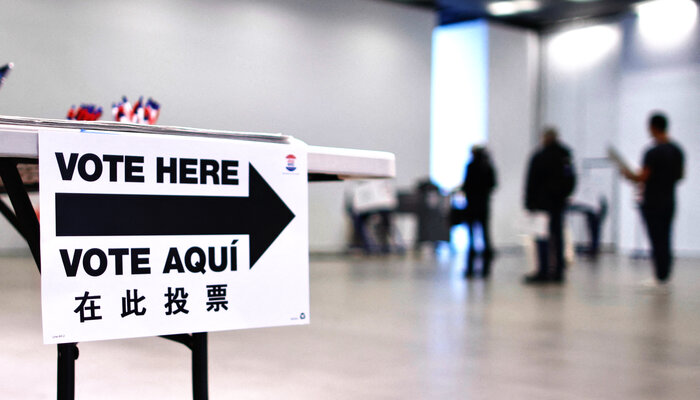Just three months into Donald Trump’s second term, his administration has revealed how it will carry out the anti-voter agenda laid out in Project 2025. Before the 2024 election, the Brennan Center warned of the Heritage Foundation’s controversial policy blueprint. Citing debunked claims of a stolen 2020 presidential election and widespread fraud, it proposed that the Justice Department use a century-old civil rights law to investigate and prosecute those who help others exercise their right to vote — namely, election officials and voter registration groups. Now, the administration has demonstrated how that plan might take shape. Before the Justice Department attempts investigations and prosecutions, both of which would require actual legal support, it will use executive actions and public threats intended to accomplish the same goal: instill fear and chill future efforts to safeguard elections.
The administration’s tactics became clear earlier this month, when the president targeted the former director of the Cybersecurity and Infrastructure Agency (CISA) — a federal agency tasked with leading the national effort to understand, manage, and reduce risks to election infrastructure. Trump himself appointed that director, Christopher Krebs, when he created CISA in 2018, but fired him after the agency declared the November 2020 election “the most secure in American history.” In a new presidential memorandum, Trump instructed his administration to revoke any security clearances held by Krebs and his employer, directed the Justice Department to “review” all of Krebs’s actions during his time at CISA, and accused Krebs and CISA of “falsely and baselessly den[ying] that the 2020 election was rigged and stolen, including by inappropriately and categorially dismissing widespread election malfeasance and serious vulnerabilities with voting machines.”
The president’s latest attack on CISA and its former director comes on the heels of a months-long campaign to seek retribution against those who protected the 2020 election. In a March 14 speech at the Justice Department, Trump issued a sweeping threat against those who helped administer that election. “What a difference a rigged and crooked election had on our country,” he said. “And the people who did this to us should go to jail. They should go to jail.” In that same speech, the president singled out specific lawyers who challenged his attempts to subvert the 2020 election. Days later, he issued an executive order urging “accountability” for lawyers and law firms who engage in “misconduct,” once again targeting one of those same lawyers by name.
Trump’s appointees have expressed their support for these efforts. His pick to lead the FBI, Kash Patel, stated in 2023, “We’re going to come after the people in the media who lied about American citizens, who helped Joe Biden rig presidential elections — we’re going to come after you.” Trump’s head of the Justice Department’s Civil Rights Division, Harmeet Dhillon, has served as a loud proponent of the lies surrounding the 2020 election and the same sort of conspiracy theories that underlie Project 2025’s proposal to prosecute election officials. Since Dhillon’s confirmation, the division’s Voting Section has debuted a new mission statement that shifts away from protecting voting rights and focuses instead on ridding elections of “fraud, errors, or suspicion.” Dhillon’s statements in the lead-up to the 2024 election, which accuse election officials of rigging the 2020 election, suggest that the section’s new mission may spur efforts to target those same officials.
While the president and his appointees have sought retribution through executive actions and public threats, a top federal prosecutor has provided the first example of how the prosecutions proposed in Project 2025 may take shape. In an email to staff, Interim District of Columbia U.S. Attorney Ed Martin announced the creation of a new “special unit” to investigate alleged election crimes and shared that it had already opened an investigation into a purported election offense. The details of the unit are not yet clear. And as we explained before, the basis for Project 2025’s proposed prosecutions is both legally and practically unsound, as it would pervert a 19th-century civil rights law to prosecute those who help others vote. But Martin’s open support for the election denial movement — in a speech at the U.S. Capitol on the eve of the January 6 attack, Martin called for “die-hard true Americans” to work until their “last breath” to “stop the steal” — raises serious concerns that the unit will pursue investigations into election officials and pro-voter groups.
Even if Martin’s special unit never brings charges, and even if the administration’s threats don’t escalate into action, the threats themselves may cause grave harm. The prospect of a president and Justice Department willing to target those who help others exercise their right to vote can have a chilling effect on pro-voter groups and election officials. Organizations may retreat from their work to engage voters. Election officials — many of whom have faced increased harassment, threats, and abuse since 2020 — may continue to leave their jobs at alarming rates. If the Justice Department does begin to investigate these groups, the chilling effects will be even more profound. And regardless of whether authorities file charges, federal investigations can severely disrupt the lives of their targets and impose significant costs in legal fees.
The stakes may rise as future elections approach. In 2020, the integrity of the election depended on election officials who refused to give in to Trump’s pressure to subvert the outcome. Georgia Secretary of State Brad Raffensperger stood his ground when the president demanded that he “find” the 11,000-plus votes Trump needed to win the state. It’s not difficult to imagine a scenario in which that same pressure is applied to an election official in a critical battleground county or state in 2026, this time with the very real threat of criminal prosecution looming over their head.
While these efforts focus on past elections, they send a clear message about the future: Those who resist election subversion will face consequences. The Trump administration has also sent the inverse message: Those who participate in election subversion will have the administration’s support. On the first day of his second term, Trump issued pardons, commuted prison sentences, and vowed to dismiss the cases of all 1,500-plus individuals charged with crimes during the attempted insurrection on January 6, 2021. The Justice Department subsequently filed a statement in court indicating that it would review the state prosecution of former Mesa County, Colorado Clerk Tina Peters to examine whether it was politically motivated. In the wake of the 2020 election, a Colorado jury convicted Peters of four felonies for giving a man affiliated with prominent election denier and My Pillow CEO Mike Lindell unauthorized access to voting equipment.
That the president has continued to fixate on elections is not surprising — they remain the most powerful tool to preserve democracy and the rule of law. We can, and must, work together to protect them from the administration’s pressure. Some Justice Department lawyers have resisted Trump’s early attempts to politicize their work. To maintain free and fair elections, more will have to do the same. If the department does begin investigations and prosecutions, we must roundly condemn them as an attempt to disrupt our democracy. The courts must do everything they can to swiftly toss legally unsound prosecutions.
Moving forward, our elections will continue to rely on officials, voter registration organizations, and voters themselves to manage, bolster, and participate in elections in the face of these new threats. States — which actually run our elections — and civil society must step up to support them. Democracy and the rule of law depend on one another. Now, more than ever, the fate of both rests in our hands.







